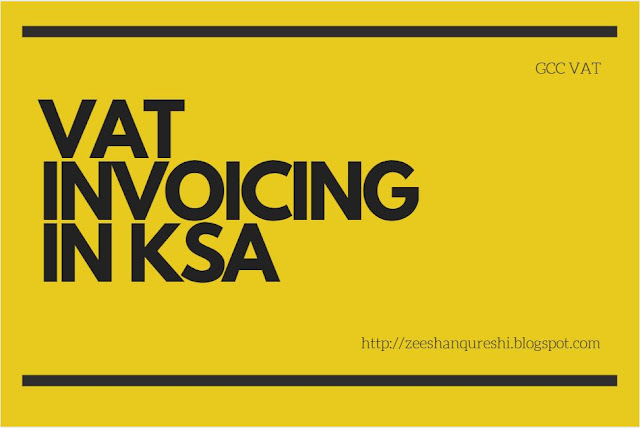VAT INVOICING PROCEDURE IN KSA
This article is in continuation to our previous articles on 'VAT in Saudi Arabia' and 'Understanding Taxation in GCC' which were published prior to the introduction of final VAT law in Kingdom of Saudi Arabia (KSA).
However, since the detailed VAT law has now been finalised we will be publishing series of articles for different provisions of the said law. In this particular blog we will discuss the mechanics of VAT invoicing in KSA.
VAT-registered suppliers must produce invoices documenting revenue and tax information on all taxable sales.
Following are the 5 things you need to know about VAT invoicing in Kingdom of Saudi Arabia:
1. DATE OF ISSUANCE
The VAT invoices are to be raised any time on or before 15th day of the month following the month when the transaction occurred.
2. COMPLEX VAT INVOICE - TRANSACTIONS ABOVE SAR 1,000
The VAT invoice must include the following details related to the transaction, provided in Arabic:
- The invoice issue date and the date of supply (if they differ);
- A sequential invoice number to identify the document;
- The supplier’s legal name, address, and tax identification number;
- The customer’s legal name, address, and, when the customer is self-billing, tax identification number (and a statement that the customer and supplier have agreed to self-billing of VAT);
- The quantity and type of goods, or the extent and nature of services provided;
- The total amount of revenue eligible for VAT & exemption , and the VAT rates (5% or 0%) to be used;
- The unit price not including tax;
- Explanation of any discounts or rebates not included in the unit price;
- The total tax payable in SAR;
- Explanation of any supply where a zero-rate, exemption, or margin scheme is used to calculate VAT; and
- Profit margin method;
3. SIMPLIFIED VAT INVOICE- TRANSACTIONS BELOW SAR 1,000
Businesses can use simplified tax invoices for goods or services valued at under SAR 1,000 that are not classified as export or internal supplies. The shorter-form invoice must include:
- The issue date of the invoice;
- The full name, address, and tax identification number of the supplier;
- The description of the Goods or Services supplied;
- The total payable for the good or service referred to in the invoice; and
- The tax payable or an indication that the total payable mentioned includes VAT;
4. CURRENCY
Invoices should always base monetary sums in Saudi Riyals (SAR). If the transactions occurred in another currency, the taxpayer should use the daily conversion rate on the date the tax becomes due provided by the Saudi Arabian Monetary Authority (SAMA) in order to convert the sum to Saudi Riyals (SAR).5. SELF BILLING
Self-billing refers to when a customer produces an invoice to document input tax it paid to a supplier, instead of the supplier providing that invoice. Self-billing is allowed in cases where the customer and supplier have agreed on it as the preferred method of tax invoicing (and the supplier has specifically agreed he will not invoice for VAT).






Thank you for sharing this valuable information. It's a great resource for anyone interested in this subject. vat return filing in Dubai
ReplyDeleteExcellent web site you have here.. It’s hard to find good quality writing like yours these days. I truly appreciate individuals like you!
ReplyDeleteAccountants in London